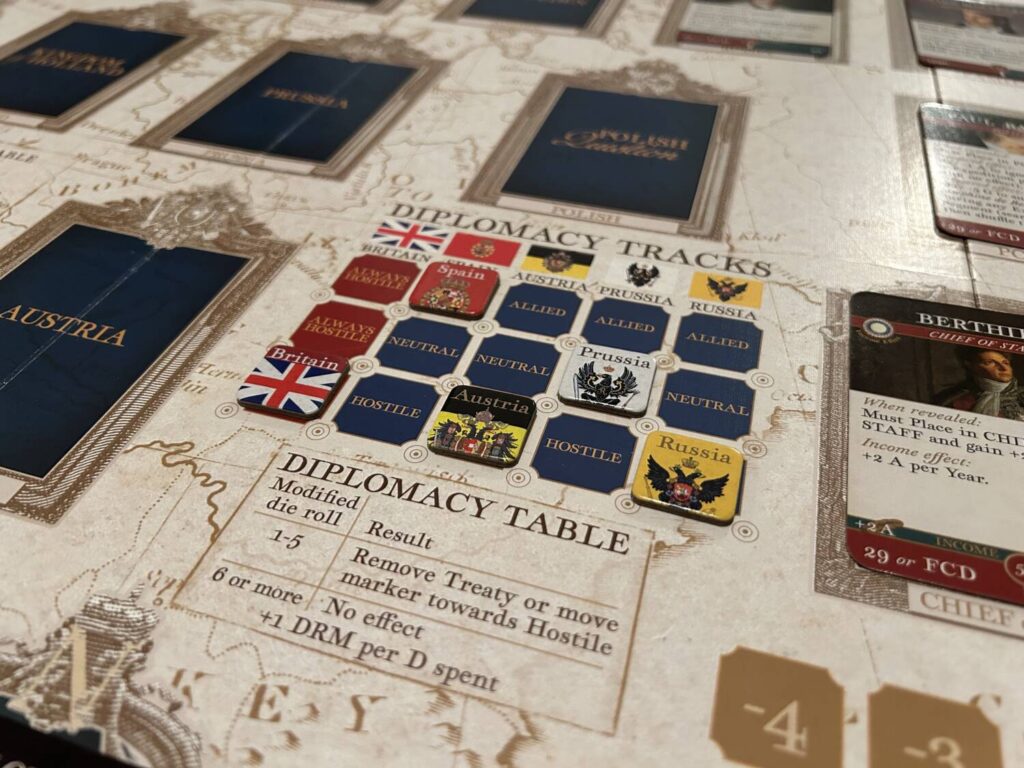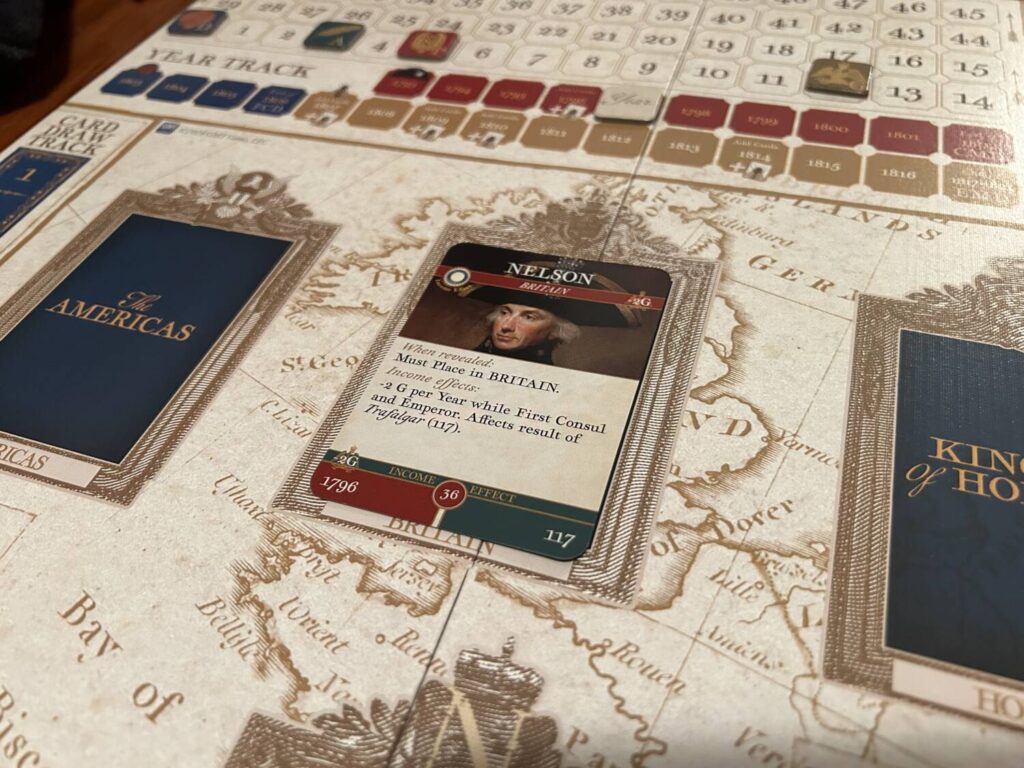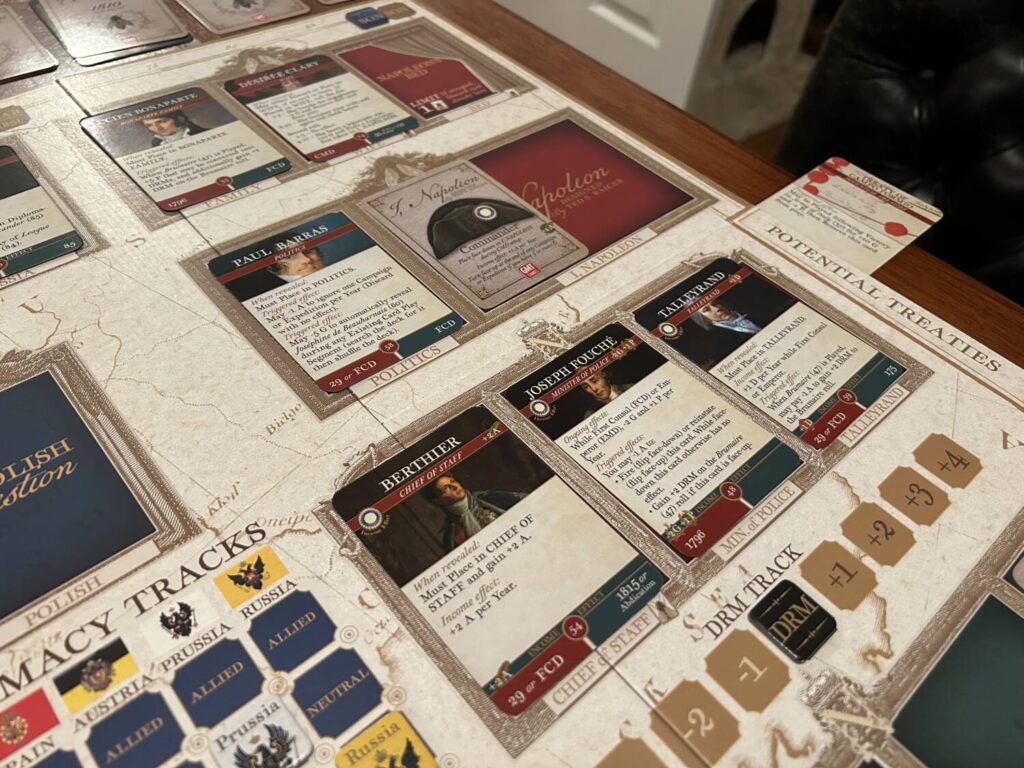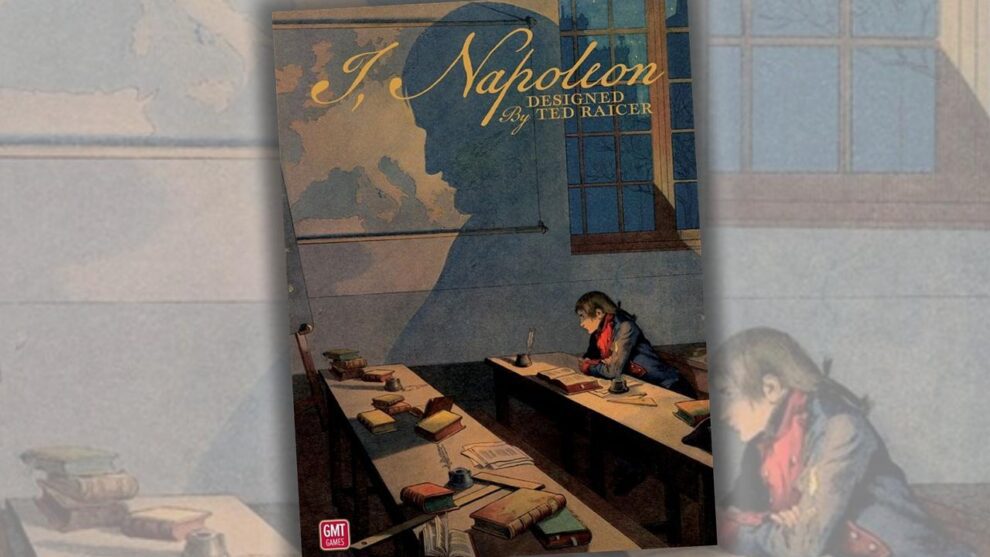Disclosure: Meeple Mountain received a free copy of this product in exchange for an honest, unbiased review. This review is not intended to be an endorsement.
Napoleon’s image has had a rough year or two, huh? Ridley Scott’s 2023 film Napoleon painted the Emperor as a horny buffoon, an accident of history, an egomaniac of little substance. Now along comes Ted Raicer’s I, Napoleon, a solo game which suggests that the very act of being Napoleon was as simple as flipping an endless series of cards, doing what they say, and occasionally rolling a die.
I, Napoleon, published by GMT, has you step into the hat of Napoleon Bonaparte for the quarter of a century between 1793 and 1817, covering the full extent of both his rule and his reign. Every bit of the game is experienced through cards, drawn one at a time from an increasingly large deck. Draw a card. Read its effect. Perhaps you gain some Diplomacy or Glory, resources indexed on a track in the upper left corner of the enormous board. Maybe you lose some, heaven forbid. You might reveal a military campaign, or a new king of Spain, or that rat bastard the Duke of Wellington. For the historical aficionado, the deck is swarming with fun little cameos.

Many cards in the deck are mandatory to implement, simulacra of the important events of history as it happened. Some are voluntary. You can tweak history in little ways. Marry another woman before meeting Josephine, perhaps. Or you could… well, honestly, that’s about it. I was stunned by how on-rails this whole thing feels. The only variation between plays comes from the order in which cards are revealed. I was there to flip a card, read the card, do the card, maybe roll a die, and then repeat the process. Over and over again. I, Napoleon is a Choose-Your-Own-Adventure book if your choices had no impact on the story, and if most page turns could lead to an immediate, catastrophic ending.
Though there are opportunities for resource management here and there, and you get to decide what commanders to use during campaigns, I couldn’t tell you one interesting or tense decision across two hours of play. Nothing I did seemed to have any real impact. Nothing felt meaningful. If you, the reader, are looking for a game about Napoleon that involves decisions and consequences, I, Andrew, cannot find much of anything to recommend in I, Napoleon.

If nothing else, the game contains good lessons for game designers. Structuring a meaningful game entirely around event cards is a challenging prompt. The thing about event cards is that they negate player agency. While Card Driven Games like Twilight Struggle, Watergate, and Votes for Women make prominent use of event cards, the players choose the order in which those cards are revealed. It’s the timing, back-and-forth that creates meaningful decisions. They work as games in part because they seldom come down to what the cards in your hand are. Rather, they are games about how you will use the cards that are there. In two of those games, you can also ignore the event on the card and perform other actions. Beyond that, all three of those games become richer experiences as you get to know the decks better. They became a matter of bluffing and second-guessing. “They might have that card, but do they have that card now?” I, Napoleon is nothing but event cards, revealed in single file. That seems like a fundamental error.
I cannot help but consider I, Napoleon in juxtaposition with Comanchería, a 2016 solo game from designer Joel Toppen that is one of my absolute favorite board games. I don’t play it often. It’s something I save for those special occasions when I know I’ll be able to fully savor the experience, that I’ll have the time to bathe in its rhythms. In the game, you control the Comanche empire across 150 years, from 1700-1850. Through a combination of straightforward mechanics and a ruthless event deck—given the history involved, the event deck would have to be ruthless—Comanchería creates an environment that is both narratively evocative and ludologicaly satisfying. Every decision feels hugely important, and every event card reveal causes your Apple Watch to recommend you go lie down.

I, Napoleon lives at almost the opposite end of the spectrum. Your choices mean little. There is no tension, only monotony. The storytelling is weak, and only comes through if you already know the history. Come to think of it, that is the meaningful distinction: in order to wring any joy out of I, Napoleon, you have to come into it knowing Napoleonic history, whereas Comanchería makes me want to learn more about the Comanche Empire.
There’s a case to be made that I, Napoleon is a philosophical argument about history and the idea of Great Men. Many cards include a roll range that results in instant loss, no matter how well everything else is going. Is this Raicer making the argument that everything is an accident of history, it’s all arbitrary, it’s all everyone pulling the next card off the deck and seeing what it says? Yeah, that’s possible. If so, that’s very interesting as an intellectual argument. I probably agree. Doesn’t make for a good game, though.












Add Comment